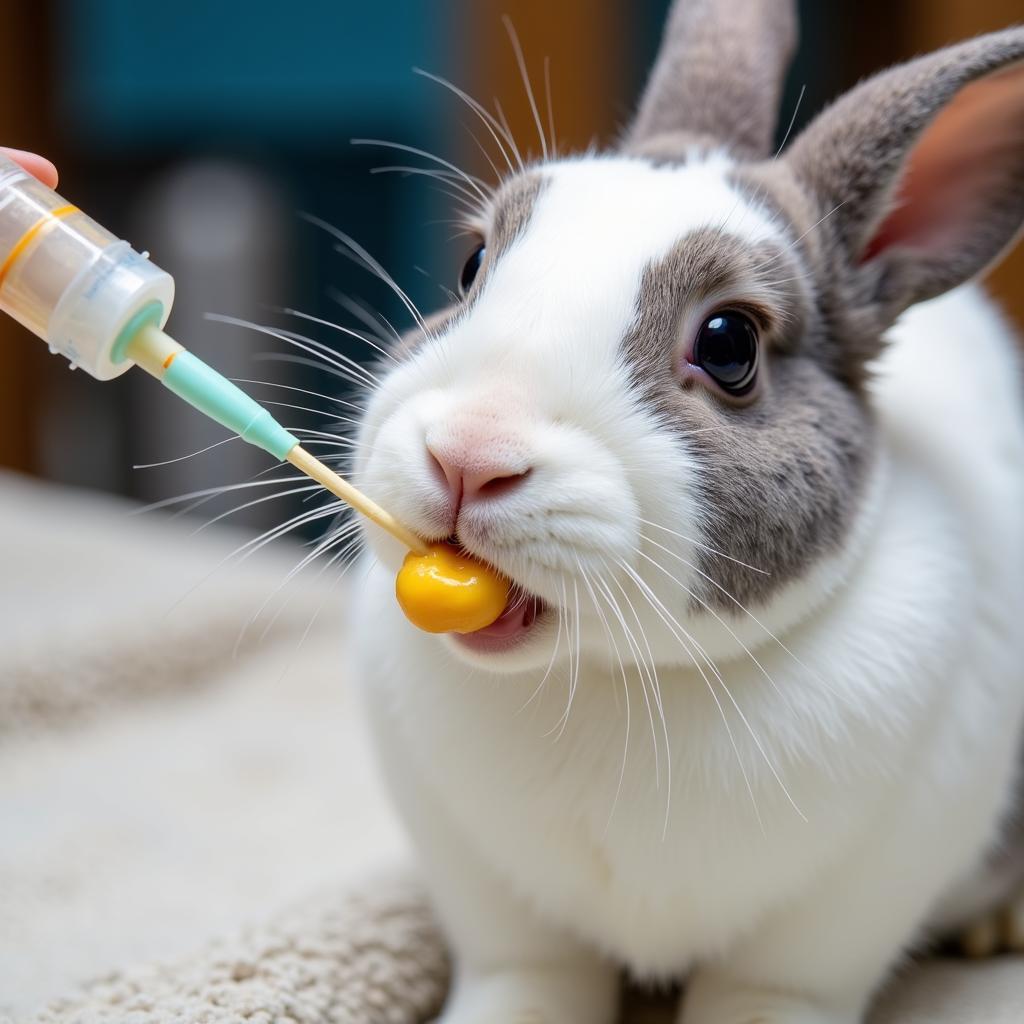Recovering from illness or surgery can be a tough time for your furry friend. Providing the right Rabbit Recovery Food is crucial to supporting their healing process and getting them back to their hopping best. Whether your bunny is dealing with a post-op slump, recovering from GI stasis, or simply needs a nutritional boost, understanding their dietary needs during this period is essential.
What is Rabbit Recovery Food?
Rabbit recovery food isn’t a specific brand or product, but rather a tailored approach to nutrition. It focuses on providing easily digestible, high-fiber foods that support your rabbit’s gut health and overall well-being during recovery. This can include critical care supplements, syringe feeding, and transitioning back to a normal diet. The key is to offer palatable, nutrient-rich foods that encourage eating and help your bunny regain their strength.
Why is Specialized Nutrition Important During Recovery?
When a rabbit is unwell, their appetite can decrease, leading to potential complications like GI stasis. A healthy gut is essential for a rabbit’s overall health, and providing the right nutrition helps maintain its delicate balance. Rabbit recovery food supports gut motility and provides the necessary nutrients for healing and energy.
 Rabbit Eating Recovery Food
Rabbit Eating Recovery Food
Choosing the Right Rabbit Recovery Food
Selecting the appropriate food for your recovering rabbit depends on the specific situation. For rabbits with dental issues, soft, easily chewed foods like leafy greens, herbs, and soaked pellets are beneficial. If your rabbit is struggling with GI stasis, critical care supplements administered via syringe feeding might be necessary. Always consult with your veterinarian for personalized recommendations based on your rabbit’s condition.
Critical Care Supplements
Critical care supplements are specifically formulated to provide a concentrated source of nutrients for rabbits who are not eating enough. These supplements are typically high in fiber and can be mixed with water to form a syringe-feedable consistency.
Transitioning Back to a Normal Diet
Once your rabbit starts showing signs of improvement, it’s crucial to gradually transition them back to their regular diet. This helps avoid further digestive upset. Start by introducing small amounts of their usual hay and pellets, gradually increasing the quantity while decreasing the amount of recovery food.
What to Feed a Rabbit Recovering from GI Stasis
GI stasis is a serious condition that requires immediate veterinary attention. Alongside prescribed medications, syringe feeding critical care supplements is often necessary. These supplements provide essential nutrients and fiber to help get the gut moving again. Fresh, leafy greens like parsley and cilantro can also be offered in small amounts once the veterinarian gives the okay.
What to Feed a Rabbit After Surgery
Post-surgery, rabbits often experience reduced appetite. Offer tempting, easily digestible foods like soaked pellets, mashed bananas, and cooked sweet potatoes. Ensure fresh water is always available. Consult with your veterinarian about pain management, as discomfort can also affect appetite.
Tips for Encouraging Your Rabbit to Eat
Sometimes, even with the right rabbit recovery food, your bunny might be reluctant to eat. Try warming their food slightly, offering it by hand, or gently stroking their head while they eat. Creating a calm and comfortable environment can also help encourage their appetite.
“A rabbit’s appetite is a good indicator of their overall health. If your rabbit is refusing to eat, it’s essential to seek veterinary advice promptly,” advises Dr. Amelia Harper, DVM, specializing in exotic animal care.
Conclusion
Choosing the right rabbit recovery food is crucial for supporting your bunny’s healing and well-being. From critical care supplements to carefully selected fresh foods, providing appropriate nutrition plays a vital role in their recovery journey. Remember to consult with your veterinarian for personalized advice and monitor your rabbit’s progress closely. With patience, care, and the right rabbit recovery food, you can help your furry companion bounce back to health.
FAQ
- What are the signs my rabbit needs recovery food? Decreased appetite, lethargy, and changes in droppings are signs to consult your vet.
- Can I make my own rabbit recovery food? While you can supplement with certain foods, it’s best to use veterinarian-recommended critical care formulas.
- How long should I feed my rabbit recovery food? Follow your veterinarian’s instructions, as the duration depends on the individual rabbit and their condition.
- What should I do if my rabbit refuses to eat recovery food? Try different flavors or consult your vet for alternative feeding methods.
- Can I give my rabbit treats during recovery? Avoid treats until your veterinarian advises it’s safe, as they can upset a sensitive digestive system.
- Is it normal for my rabbit to have less energy during recovery? Yes, lethargy is common during illness or after surgery.
- How can I tell if my rabbit’s recovery food is working? Improved appetite, more energy, and normal droppings are positive signs.
Need support? Contact us! Phone: 02437655121, Email: minacones@gmail.com or visit us at: 3PGH+8R9, ĐT70A, thôn Trung, Bắc Từ Liêm, Hà Nội, Việt Nam. We have a 24/7 customer service team.